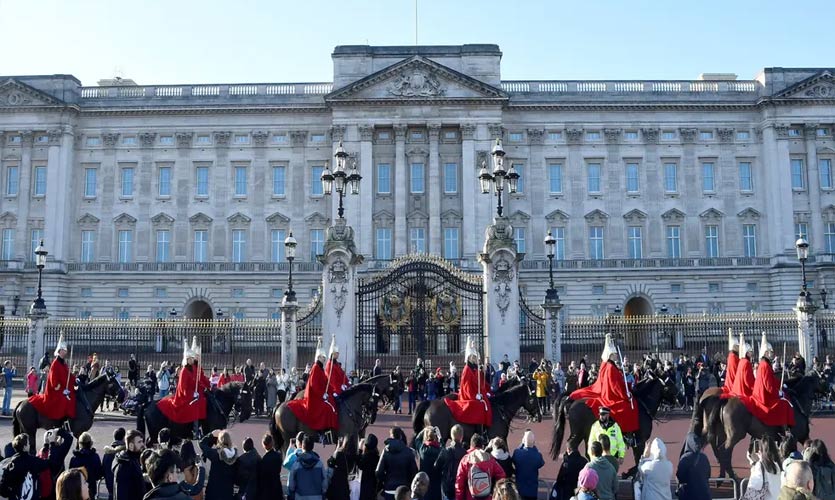According to a Guardian report citing records in Britain’s National Archives, the Buckingham Palace barred ethnic minorities from office jobs until the 1960s. As per the report, Queen Elizabeth II’s chief financial manager told civil servants in 1968 that it was not palace policy to hire “coloured immigrants or foreigners” for clerical jobs and other office jobs. As a result of the newly discovered documents, there is renewed discussion about Britain’s royal family and its stance on racial discrimination. Hours after the report was published, the palace responded to the allegations, stating that the queen and her household comply “in principle and in practice” with anti-discrimination legislation. “Claims based on a second-hand account of conversations from over 50 years ago should not be used to draw or infer conclusions about modern-day events or operations,” a palace spokesperson said in anonymous remarks. According to the royal housekeeper, the royal household adheres to the Equality Act 2010.
The Buckingham Palace has negotiated controversial clauses in the past, which were added to the constitution to protect the queen from race and gender discrimination, and remain in existence today. The report stated that there was no information about when this practice ended. There has been no official response from Buckingham Palace regarding the ban and if it was revoked. It said that they found it to be true that ethnic minorities were employed in the 1990s. Before that decade, the company did not keep records of employees’ racial backgrounds. According to the Guardian, the palace used the so-called “crown consent” mechanism, a procedure whereby the monarch grants permission to the Parliament to discuss her laws.
What Is Crown’s Consent?
Crown’s consent or Queen’s consent, as revealed by the Guardian, is “an obscure parliamentary mechanism through which the monarch grants parliament permission to debate laws that affect her and her private interests”. The publication maintained that some of the uncovered documents pertain to the use of Queen Elizabeth II’s consent, which was used to secretly sway the draft race relations legislation. Buckingham Palace says that the process is a mere formality, despite compelling evidence that the queen has repeatedly used the power to secretly lobby ministers to amend legislation she does not like to further her own benefits.
The article describes the events of February 1968, when a Home Office civil servant, TG Weiler, summarised the meetings with Lord Tryon, keeper of the privy purse, and other courtiers. Tryon believed that the queen’s household staff could be categorised as follows: “(a) senior posts, which were not filled by advertising or by any overt system of appointment and which would presumably be accepted as outside the scope of the bill; (b) clerical and other office posts, to which it was not the practice to appoint coloured immigrants or foreigners; and (c) ordinary domestic posts for which coloured applicants were freely considered, but which would, in any event, be covered by the proposed general exemption for domestic employment.” In part, they were concerned that, if the legislation applied to Her Majesty’s household, it would give it a legal basis for criticism for the first time.
Another article by the Guardian reported that there have been more than 50,000 calls for a parliamentary investigation into the legislation-vetting mechanism that enables the queen to sign off on legislation before it is voted on by British lawmakers. Following an investigation by the publication about the crown’s consent, a petition was launched. Under the process, ministers are required to notify the queen of draft laws that may affect her personal property, such as Sandringham and Balmoral. The petition says it is “unfathomable” that in a democracy, such power rests with the crown. The queen’s spokesperson previously stated: “Whether the Queen’s consent is necessary for matters that would affect crown interests, such as royal personal property and interests, is decided by parliament independently of the royal household.”
Read more about the Ceuta Border Emergency
Queen Elizabeth II has personally been exempt from those equality laws for more than four decades. In a statement, the Buckingham Palace confirmed that she has been exempt from the laws that prohibit discrimination, noting that there is a separate process in place to handle complaints related to discrimination.
A series of racial and sexual equality laws were passed in the 1970s to eradicate discrimination, resulting in an exemption from the law. There is a good chance that the documents will cause the royal family’s historical and current relationship with races to be reexamined. Inextricably linked with the family’s history is that of the British empire’s, which ruled over people all across the globe for centuries. Several members of the royal family have been criticised for their racist remarks time and again. It was in March, when the Duchess of Sussex, who is the family’s first mixed-race member, alleged that a family member expressed concern about her yet to be born child’s race during her time with the royal family.










